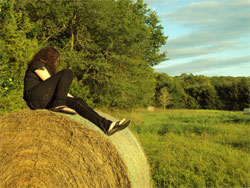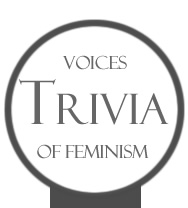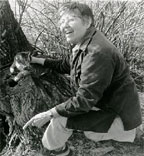Dyke on a Haybale: A Lesbian Teen In Kansas Speaks Out
Natalie G.

I am a 17-year-old-lesbian living in Lawrence, Kansas, and just those two places – Lawrence and Kansas – are very different when it comes to gay rights. Kansas is one of the most conservative states in the country, and not long ago, the legislature decided gay people could never marry, yet Lawrence has a thriving gay community because of the University of Kansas, sometimes called "Gay-U" instead of KU, and because Lawrence is a town full of artists.
As both a confused teenager and a lesbian trying to find herself, I question what's happening around and within me often. Let's just say that a mixture of teenage trauma-drama, being a lesbian and hanging out with other non-heterosexuals and raging hormones makes my living environment all too interesting. I have an excellent support group at home through my family, and at school, through our own little Gay-Straight Alliance. In our Alliance we can talk about what we're feeling and how it is affecting us. Also, we have many different speakers come in and talk to us about how to survive as a lesbian, gay, or questioning person. At the same time, most of my friends are usually freaking out so much about their own gender/school/pressure/etc. problems that some days we don't get very far in looking at issues as a group.
Many of my friends are still questioning their own sexuality. Over half of my friends have labeled themselves bisexual; the others are either straight, or questioning. Very few people in my school are now actually just gay. Bisexuals can still label themselves gay, but sometimes when they do this, it can be even harder for them to fit into society. People argue with them all the time, "Why can't you just pick a side! I mean I'm fine if you're gay or straight, but why do you have to be in the middle and bisexual!" I don't have a problem with how people label themselves, although I wish my bisexual friends wouldn't argue with me over how can I only be a lesbian.
Like many, my realization about my sexual orientation was sparked by my environment. I grew up in a family that taught me to accept all people no matter their race, ethnicity, sexual orientation, or ideas. My mother had gay friends, so it was no big deal. Around the age of 12 I started to look at the world differently. I started to look at girls. At first I did not realize what I was doing, then I realized that other people did not look at girls the way that I did. I tried to convince myself that it was just a phase I was going through or that I was looking at girls because they had gone through puberty already, and I was still years away. However, as time went on I realized it was neither a phase nor due to late puberty. Finally I started thinking to myself: What if I am actually a lesbian? The idea went around and around in my head—it wasn't like there was one clear moment that I first knew—until finally I confronted it. I can't quite remember the exact moment, but somehow after a few months I just knew.
Coming out to my parents was very hard for me. Throughout the years I heard many people telling horrible stories about what had happened to them when they came out. In some cases their parents did not believe them. Some had even been thrown out of their homes. I was terrified that my parents, although very liberal, would somehow not accept this about me. I still remember the night when I came out to my parents, a few months before my Bat Mitzvah. I decided to tell them separately. I started with my dad. I sat him down and started feeling shaky and more scared than I had ever been in my entire life. "Dad, I need to tell you something very important," I began. He sat there quietly. "Dad, I'm gay." At first there was silence, and then he said, "That's fine." He went on to explain to me that whoever I was, he would love me. When I told my mom one day as she drove and I sat in the back seat, she seemed to be thrilled. "I'm going to have three daughters-in-law!" she cried (I have two brothers). I know that my story is not like most people's coming out stories. Many are extremely painful. I have no idea what that would feel like.
Since most of my friends who initially identified as lesbian now have realized that they are bisexual, it is hard to find people that I can talk to about being gay. Like many of my friends I still struggle with my sexuality. I am not 100% sure that I am a lesbian. However, the definitions of bi that my friends use do not fit me in any way. They describe not seeing gender, only personalities. Or they say that they find both sexes attractive in their own ways and would be happy with either. I occasionally look at boys, but not in a sexual way. I see the personalities and qualities that make them who they are, not their gender. With women I feel a much deeper connection and understanding. It is easier for me to get along with a woman I have never even met. With men it is much harder for me to make this connection. This lack of connection is what makes me sure that I am not bisexual or pansexual. Bisexuals, when they are in a same-sex relationship, sometimes call themselves gay, but they can also switch to at least seeming to be straight. The question of whether they are or aren't gets much more complicated, and sometimes much more awkward. Once when I was with my friend she started talking non-stop (and explicitly) about her boyfriend and the loving relationship she had with him. When I told her that I was a lesbian, she said, "Oh, sorry, I thought you were bi!" Sometimes I wish that my bisexual friends would see some of the issues that confront people like me who can't "pass" as straight.
For all these reasons, this younger generation of gays and lesbians faces problems that our predecessors didn't even worry about. Most of the time, these problems are ignored by older generations with the saying, "You guys have it so much easier than I did! You can come out. If I had told people I was gay in my high school, they would have killed me! It's so much easier for you guys, so what are you complaining about?" But there are still difficult problems, just different ones. Coming out has become easier, but only for some. Many teenagers are still kicked out of their homes, and gay bashing is still fierce (from outward violence to the popular saying, "That's gay"). Over the years we have made many improvements, but it is still hard for kids in this society. The questions of gender, identity, and everything that makes us who we are are much harder to figure out these days because the possibilities for how we identify ourselves are so much wider. One of the hardest problems that we face today is trying to get the older generation to understand what we are going through.
That brings me to the big question of the day: Are lesbians going extinct? The answer is yes and no. Many lesbians have found that they are bi, going through a phase, or are actually straight. This has reduced the population of actual lesbians, and also gays. However, this problem has made the people who are lesbians stronger and more specific in embracing who they are and what they stand for. The lesbians that I have met are determined to not only fight for out human rights, but to also help in the fight against climate change, for better health, and a generally better world. Lesbians may be fewer, but those who are now have a more distinct feeling of determination than ever before.
Do I think that we are going extinct? No, I don't! There are still people like me who identify as lesbian, even while hanging out with all my friends who call themselves bi, and even while living in Kansas, where my high school is one of the only ones statewide with a strong Gay-Straight Alliance. As long as this keeps happening and we get stronger, it will be a long, long time before our light goes out.
In the meantime, walking the halls of my high school can make a girl feel a little isolated. Being one of the only lesbians in the school can sometimes be hard. Yet all of my friends (even if they are not in the LGBT circle) can understand me and relate to my problems, and I also talk with lesbians far and wide on Facebook regularly, which makes me feel like I'm part of something. I have found lots of comfort in foreign LGBT films in which the women (or men) are not afraid to show the world who they are. The film industry has become more gay-friendly with the release of movies like Milk.
In fact, the film Milk helped me learn much more about who I am and where I come from. Before I saw Milk I knew a good amount about gay history, but afterwards I realized that I knew little to none. Because of this I strived to learn as much as I could. In addition to seeing it in the theater three times (with my Gay-Straight Alliance group, my mom and aunt, and then my dad), buying it as soon as it came out, and also watching The Times of Harvey Milk, I decided to research the gay liberation movement as part of an advanced American History class at my high school. When we each had to come to class as a historic character, I came as Harvey Milk. I didn't really dress like him, but I tried to convey as much of his message as I could while still being me. To prepare, I had read a pile of books on his life and on the gay liberation movement when it really got going in the 1970s. When the time came to present, my teacher was a little concerned about me choosing Harvey Milk, but at the end of the class, he said I did a great job of talking about gay and lesbian civil rights in his voice.
While it might seem strange for a lesbian to get this into the story of a gay man, for me, this movie brought me, as a lesbian, home to where I feel f I can be proud of who I am. Although the initial population of lesbians has declined, in my mind there is no way that we are going extinct. We may have a smaller population than some of the other LGBT realms, but we still have a strong bond to each other and the beliefs that we hold dear. In my opinion, as long as we remember what we set out to do in the world, we will never go extinct. For my part I will do my best. This coming year I will be the president of our Gay-Straight Alliance and will do all that I can to make sure that new and old students feel comfortable about who they are and to empower them to go out and fight for not only their rights but also for others who suffer persecution.
About the Author
Natalie G. is 17 years old. She lives in Lawrence, KS and spends her days playing with her cats, rolling around the dogs, and, like any other teenager, surfing the web. She is president of her school's Gay-Straight Alliance, because of that she is constantly involved in the LGBT world. Besides that, she enjoys music, being with friends, and living like any other 17-year-old.
Join our Trivia - Voices of Feminism group on Facebook

